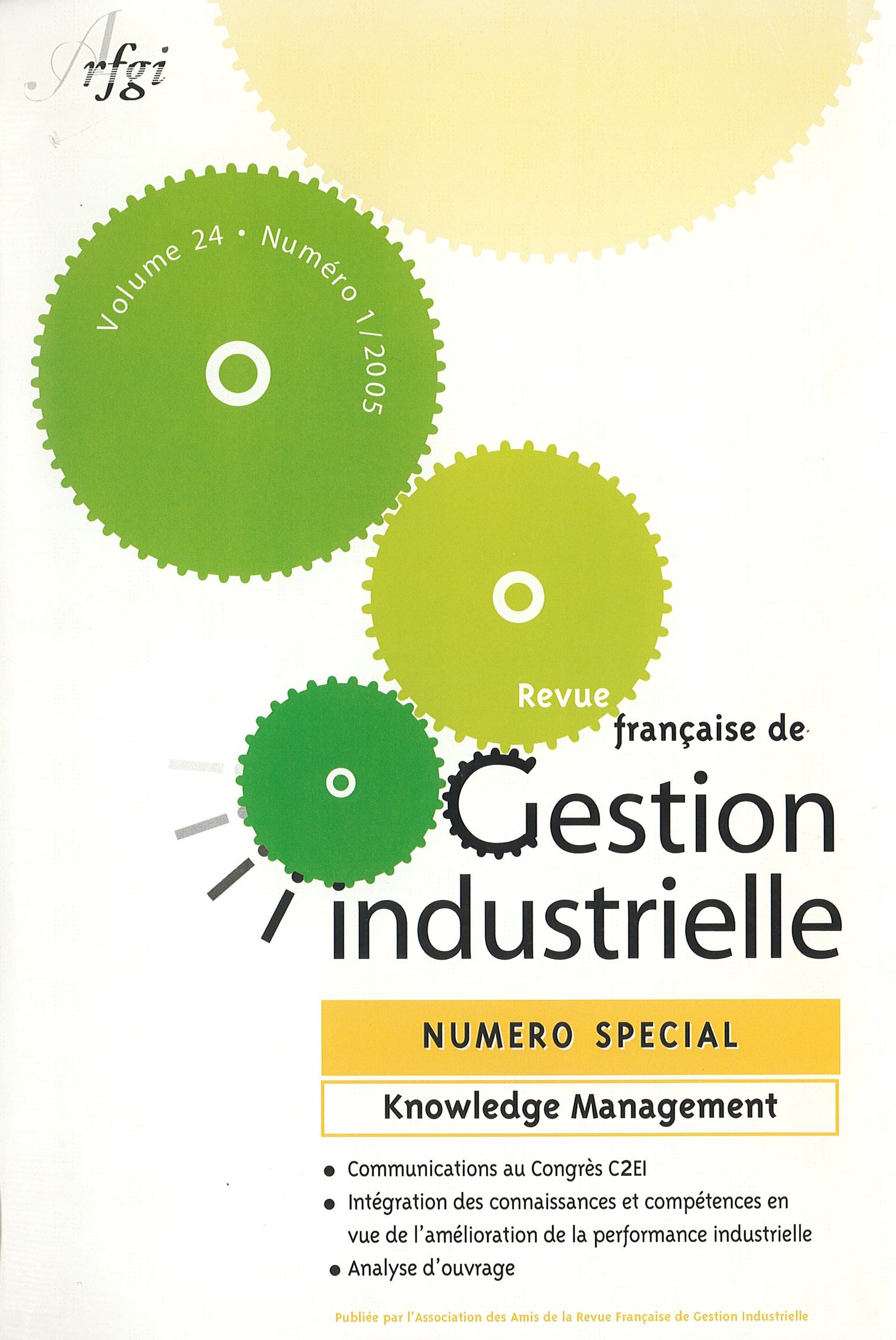Management de l'innovation et gestion des connaissances : aspects conceptuels de la synergie TRIZ- raisonnement à partir de cas
DOI :
https://doi.org/10.53102/2005.24.01.436Mots-clés :
TRIZ, Capitalisation des connaissances, Raisonnement à partir de cas, Management de l'innovationRésumé
De prime abord, l'innovation industrielle c'est la transformation d'une idée vers un produit vendable. Au cœur de cette transformation, se déroule un processus créatif qui nécessite entre autres une énorme mobilisation des connaissances. Gérer ces deux éléments est une tâche complexe et difficile. Dans cet article, on propose un modèle où la Théorie de Résolution des Problèmes Inventifs (TRIZ) et le Raisonnement à Partir de Cas (RPC) s'intègrent afin de proposer une vision de TRIZ sur le développement de la technologie et de fournir un modèle conceptuel pour capturer, indexer, stocker et rendre utile les connaissances produites lors de la résolution d'un problème.
Références
Aamodt A. et Plaza E; 1994, Case-Based Reasoning: Foundational Issues, Methodological Variations, and System Approaches. AI Communications. IOS Press, Vol. 7: 1, pp. 39-59.
Altshuller, G., 1999, The Innovation Algorithm. TRIZ, systematic Innovation and Technical Creativity. Technical Innovation Center, First edition.
Altshuller, G., 2001, 40 Principles : 1RIZ Keys to Technical Innovation. Technical Innovation Center, Second printing.
Cavallucci, Denis, 1999, TRIZ: l'approche Altshullérienne de la créativité, Techniques de !'Ingénieur, A 5211.
Choulier, Denis, 2000, TRIZ : un état d'esprit. Rapport interne n°04-00. Université de technologie de Belfort Montbéliard.
Choulier, Denis et Draghici, George, 2000, TRIZ: une approche de résolution des problèmes d'innovation dans la conception de produits.
Cunningham P., 1998, CBR: Strengths and Weaknesses, in the 11th International Conference on Industrial and Engineering Applications of Artificial Intelligence and Expert Systems.
Fuchs, Béatrice, 1997, Représentation des connaissances pour le raisonnement à partir de cas : le système Rocade. Thèse de Doctorat à l'université de Jean Monnet, Saint Etienne, France.
Grundstein M ; 2000, "Repérer et mettre en valeur les connaissances cruciales pour l'entreprise", Actes du lOème Congrès International de l' AFA V, Paris.
Kaster Daniel, Medeiros Oaudia, Rocha Heloisa, 2004, Supporting modeling and problem solving from precedent experiences: the role of workflows and case-based reasoning, Environmental Modelling & Software 2004, Elsevier.
Kolodner, Janet, 1993, Case-Based Reasoning, Morgan Kaufmann Publishers, Inc.
Leake, D, 1996, Case-Based Reasoning : Experiences, Lessons, and Future Directions. Menlo Park AAAI Press/ MIT Press
Liao T.W., Zhang Z.M. and Mount C.R, 2000, "A case-based reasoning system for identifying failure mechanisms", Engineering Applications of Artificial Intelligence 13, pp.199-213.
Limam Mansar Selma, Marir Farhi and Reijers Hajo A., 2003, "Case-Based Reasoning as a Technique for Knowledge Management in Business Process Redesign", Academic Conferences Limited L6pez Ramon et Plaza Enric, 1996, Case-Based Reasoning : An Overview. IIIA-Artificial Intelligence Research Institute, CSIC-Spanish National Research Council.
Malek, Maria, 1998, Etudes des aspects liés au contenue et à l'organisation de la mémoire dans le RàPs, Ecole des Mines de Paris.
Mazur, Glenn, 1996, Theory of Inventive Problem Solving (1RIZ), Publié dans le http:/ /www.mazur.net/.
Restrepo J; Christiaans H; Green W; 2004 "Give me an Example: Supporting the Creative Designer", CADE2004 Web Proceedings of Computers in Art and Design.
Savransky, Semyon, 2000, Engineering of creativity. Introduction to 1RIZ Methodology of Inventive Problem Solving. CRC Press.
Schank, R ; 1982, Dynamic Memory: A Theory of Learning in Computers and People. Cambridge University Press.
Sushkov V, Mars N. and Wognum P, 1995, "Introduction to TIPS: a theory for creative design" Artificial Intelligence in Engineering 9 (1995) pp. 177-189.
Terninko, John, Zusman, Alla et Zotlin, Boris, 1998, Systematic Innovation: An Introduction to TRIZ, St. Lucie Press.
The 1RIZ Journal, 2004, sous la rubrique Contradiction Matrix and the 40 Principles for Innovative Problem Solving. www.triz-joumal.com.
Tounkara, Thiemo, 2002, Gestion des Connaissances et Veille : vers un guide méthodologique pour améliorer la collecte d'informations. Thèse de Doctorat à l'Université Paris Dauphine.
Zlotin, Boris & Zusman, Alla, 1999, Managing Innovation Knowledge: The Ideation Approach to the Search, Development, and Utilization of Innovation Knowledge, Ideation International.
Numéro
Téléchargements
Comment citer
Rubrique
Licence
(c) Tous droits réservés RFGI 2021

Ce travail est disponible sous licence Creative Commons Attribution - Pas d’Utilisation Commerciale 4.0 International.











